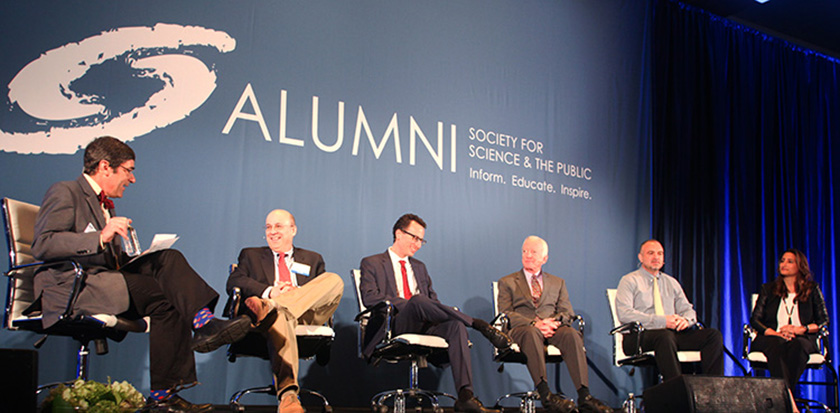Alumni, Regeneron STS, Science Talent Search, Westinghouse STS
Science Talent Search offers ‘a different set of heroes’

Participating in the Westinghouse Science Talent Search in 1976 made George Yancopoulos realize “there’s a whole different set of heroes.”
“Everyone revered the Westinghouse winners. How so many went on, changed the world, and became Nobel Prize winners,” said George at the Alumni Conference on March 13, along with other award-winning panelists.
After STS, George became a founding scientist and Chief Scientific Officer at Regeneron Pharmaceuticals, which discovers and develops new medicines. Regeneron is now the new title sponsor of the Science Talent Search, now the Regeneron Science Talent Search.
Science is failing and trying again
“STS changed my life in many ways — it let me set my expectations higher,” said Daniel Skovronsky, the founder and CEO of Avid Radiopharmaceuticals. He was a Westinghouse STS 1991 finalist.
In science, and medicine, you can expect to fail all the time, according to Daniel. He said scientists should strive for a high rate of failure.
Business people can’t tell you to cure a disease. There’s no business model for that, it all comes from the science.
—George Yancopoulos
“Our drugs failed, the FDA didn’t approve us, but we thought we were doing something so new that of course that would happen,” Daniel said. “You have to persist and get through it. Otherwise, I would’ve given up long ago.”
Science: The intersection of business and engineering
George said science is what brings him into work every day. “Our company is entirely science driven,” he said. “Our board of directors are scientists, including three Nobel Prize winners.”
That’s the best way to run a pharmaceutical company, George said. “Not just to focus on the business side, but to let science drive the business,” he said. “Business people can’t tell you to cure a disease. There’s no business model for that, it all comes from the science.”
Robert Sproull’s father brought him to work in his lab to assist with dangerous experiments like loading low helium. “My father was interested in the process more than the actual apparatus, which got me interested and turned me on to the engineering side,” said Robert, a Westinghouse STS 1964 finalist and former Vice President and Director of Oracle Labs.
“When scientists have to get something done in the real world, it’s engineering,” he said.
Hayley Bay Barna credits her Intel STS background for offering her the foundation for her career in business. Hayley, an Intel STS 2001 finalist, is the co-founder of Birchbox, which markets itself as a better way to shop for beauty products.
“Intel STS helped me throughout my career and was formative in taking a leap to start my own business,” she said.
While Haley said she doesn’t identify as a scientist, she does have a scientific mindset. “I like to solve problems,” she said. “I’ve always loved data and learning how people think about money, how they make economic decisions. I took an experimental approach to economics.”
She encouraged young people interested in STEM to have the courage to go for their dreams. “You have to put yourself out there, even if you don’t have the age or experience, you can make a difference.”
Technology is also a main part of the development of science. “We believe in technology development,” George said. “You can change the field by finding new ways to do science, make new medicines no one thought of before. Putting them together can sometimes create magic.”
Persistence and optimism
Paul Maddon reflected on the importance of remaining persistent in both science and business. He was a Westinghouse STS 1977 finalist and is the founder and Vice Chairman of Progenics Pharmaceuticals.
“You have to be an optimist,” Paul said. “You can’t get through years of toiling in a lab with failures without being one.”
Strong communication skills are also part of the key to success in the business of science, he said. “You have to be able to communicate your vision to the outside world. That’s what attracts investors willing to take the journey with you,” he said.
Robert highlighted curiosity as the necessary ingredient for a scientist. “We have to be open to find questions. If you don’t pursue the answers, it has no point.”
George agreed with remaining persistent in the face of adversity. Scientists must find the joy in seeking answers, he said.
“We most enjoy pushing frontiers, the unknowns, not quite getting the answers you want and figuring out what to change to get to the next level,” George said. “Scientists are some of the best at making businesses.”
George also considered focus a dirty word, because it can limit the mind. “Challenge your minds and work on the most important problems for mankind. The only way to elevate ourselves is to solve problems,” he said.


